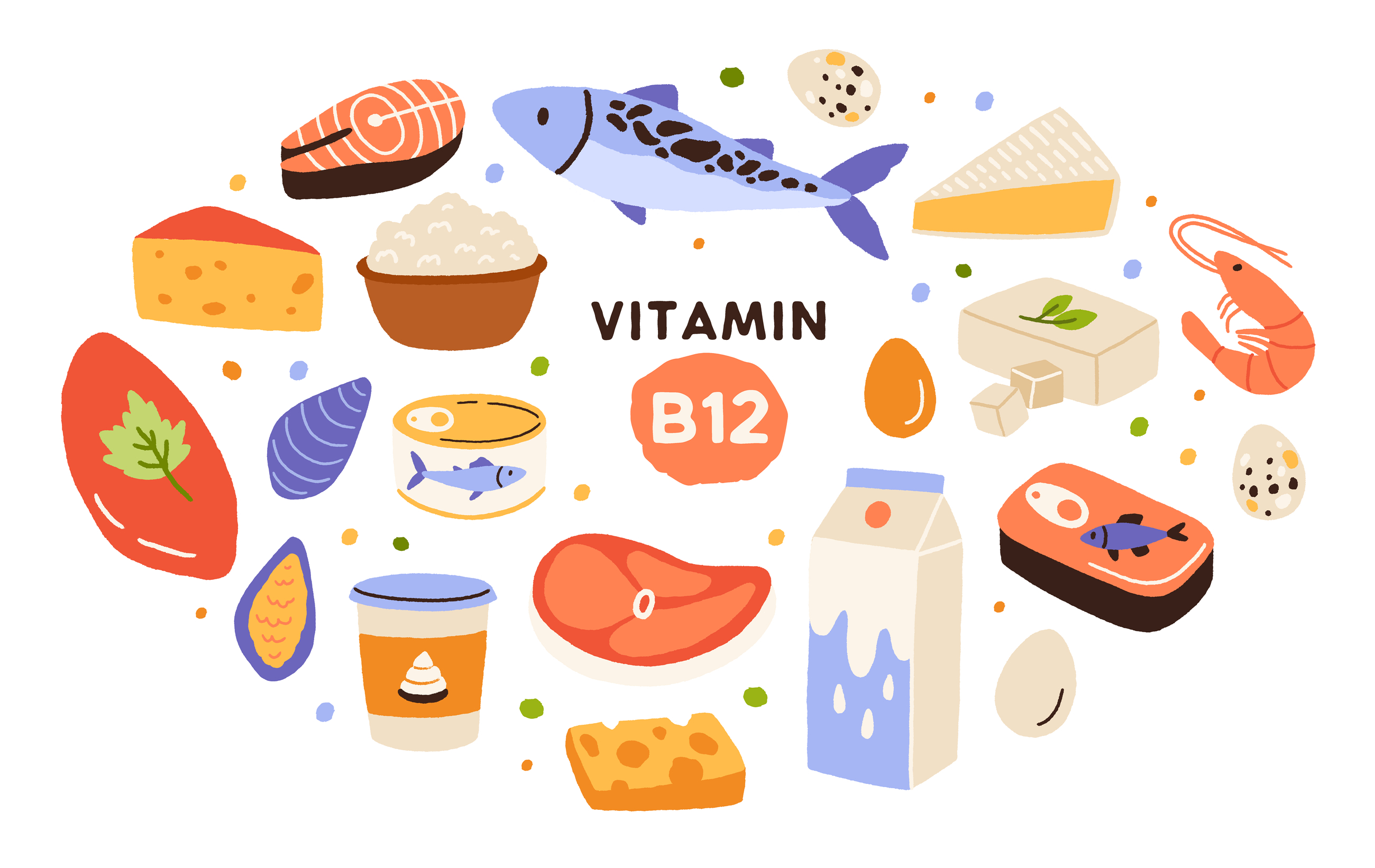What is Vitamin B12? Why Do I Need It?

Vitamin B12, also known as cobalamin, is an essential nutrient required for a bodily process called methylation, which is involved in gene expression, cellular function, and embryonic development.
A tidbit of nerdy science tells us that
Vitamin B12 → cofactor for two enzymes, one being methionine synthase
Methionine Synthase → converts homocysteine to the essential amino acid, methionine
Methionine → required for the formation of S-adenosylmethionine (SAM)
S-adenosylmethionine → a universal methyl donor for almost 100 different substrates, including DNA, RNA, proteins, and lipids
There is emerging evidence that a mother's DNA methylation capabilities are influenced by diet, including adequate nutrient amounts, and directly impact the growing fetus. Healthy methylation is needed for the proper development of brain and nerve cells.
Impact on the Baby
Working hand in hand with folate, adequate vitamin B12 is crucial for brain and nervous system formation in a developing fetus. As with folate, being deficient in vitamin B12 can increase the risk of neural tube defects threefold, such as spina bifida and anencephaly. Without adequate levels of B12, folate can't be metabolized appropriately and used by the cells, and the risk of miscarriage and preterm delivery goes up.
Impact on the Mother
For you, as the mother, B vitamins are essential for maintaining physical strength during pregnancy. Assisting in the metabolism of carbohydrates, proteins, and fats, adequate vitamin B12 intake elevates mood and energy levels and assists with healthy blood pressure levels. It promotes cognitive health in mom and stress management. Vitamin B12 helps prevent megaloblastic anemia, a red blood cell condition that makes people tired and weak due to reduced oxygen being carried to various tissues.
Long-Term Infant Health
Adequate nutrient intake is important for your baby's short and long-term health. Maternal deficiency of vitamin B12 can lead to serious consequences as your child grows, including infant developmental delays, stunted growth, or motor problems. In one study, infants of mothers who were in the lowest decile of vitamin B-12 concentrations at 28 weeks of gestation performed less well on attention and memory tests than infants born to mothers of the highest decile. The first 1000 days after conception are regarded as the most critical time for brain development. Seeing as pregnancy is approximately 280 days, a lot of brain development occurs in infancy. During this period, brain growth is rapid and highly susceptible to environmental influences. Whether through maternal breast milk with sufficient vitamin B12 or other dietary sources, infants need vitamin B12. Moderate and severe vitamin B12 deficiency has been associated with demyelination and brain atrophy in infants. Furthermore, research has shown an association between low maternal vitamin B12 during pregnancy and insulin resistance in children at age 6.
Who Should Be Most Cognizant of Possible Vitamin B12 Deficiency?
It is estimated that up to 15% of the general population has a vitamin B12 deficiency. However, Vegetarians and vegans are highly susceptible to vitamin B12 deficiency since this critical nutrient is only found in animal foods. Individuals can also experience difficulties absorbing vitamin B12 from food, a lack of intrinsic factor (due to pernicious anemia), gastrointestinal surgery, or prolonged use of certain medications (metformin or proton pump inhibitors) that can all lead to increased risk of deficiency.
One study measured vitamin B12 status in the first, second, and third trimesters among pregnant women eating a vegetarian diet (that included eggs and dairy), a low meat diet (<10.5 oz of meat per week), or an omnivorous diet. The RDA for B12 was met in 60% of vegetarians, 94% of low meat-eaters, and 100% of omnivores, yet deficiency was still relatively common. The latest research suggests that the current RDA underestimates the need for this vitamin during pregnancy by approximately 3-fold.
How Should I Get It?
Animal foods are a great source of vitamin B12; however, supplementing with this water-soluble vitamin in doses exceeding the RDA (more on this to come!) is safe and supportive in achieving healthy vitamin B12 levels for both mom and baby. Supplementation with vitamin B12 during pregnancy can affect infant vitamin B12 status and health outcomes. Daily oral vitamin B12 of 50 µg significantly improves maternal plasma and breast milk measures of vitamin B12 and multiple measures of infant vitamin B12 status.
Methylcobalamin and adenosylcobalamin are metabolically active forms of vitamin B12. Methylcobalamin is the form found in our food and cells. Adenosylcobalamin is also an active coenzyme form that supports energy and a healthy metabolism. Cyanocobalamin, a non-active form, is found readily in prenatal vitamins. It can become biologically active after it is converted to methylcobalamin or 5-deoxyadenosylcobalamin. However, it relies on the efficiency of the mother's MTHFR gene to be successfully converted. It consists of a harmful compound that requires additional processing for safe removal from the body. This form of the vitamin is not ideal.
How Much?
RDAs are heavily researched nutritional targets and serve as strong starting points for dietary intakes. The pregnancy RDA for vitamin B12 is 2.6 mcg. However, many experts currently point to research that the RDA for vitamin B12 is grossly inadequate. Specific research shows that vitamin B12 intake in pregnancy should triple the current RDA in dose, mainly since we absorb only a fraction of what we consume through our diet. B vitamins are water-soluble and rely on optimal digestive functioning to be absorbed well. Other experts concluded that in persons with normal absorption, an intake of 4-7 micrograms of vitamin B12 per day was associated with an adequate vitamin B12 status, suggesting the current RDA of 2.4 micrograms for non-pregnant people might be inadequate for optimal biomarker status.
Those women who do not eat meat or rely entirely on a prenatal vitamin to meet their needs for vitamin B12 should be extra concerned about the latest research on dosage. B12 is one nutrient where actual needs, particularly during pregnancy, are known to be higher than current estimates. It is also important to note that there is no established Upper Limit for vitamin B12 because of its low potential for toxicity. Even at larger doses, vitamin B12 is generally considered safe because the body does not store excess amounts.
Am I Getting It From Food?
Yes, vitamin B12 is found in a lot of commonly consumed foods. It is naturally present in foods of animal origin, including fish, meat, poultry, eggs, and dairy products. In addition, certain cereals and nutritional yeast are fortified with vitamin B12 and have high bioavailability.
Animal products full of B vitamins
- Salmon
- Liver (and other organs)
- Milk
- Eggs
- Beef
- Oysters
- Clams
- Mussels
- Chicken
- Turkey
- Yogurt
- Pork
- Trout
How Do I Know If I Am Getting Enough?
There are several important metrics to assess vitamin B12.
| Marker | Description |
| Blood Levels of Methylmalonic Acid (MMA): | A very sensitive marker of vitamin B12 status, an MMA level greater than 0.271 micromol/L suggests vitamin B12 deficiency. A vitamin B12 deficiency always leads to an increase in MMA levels. However, MMA levels can also rise with age and renal insufficiency, so the elevation by itself is not diagnostic. |
| Blood Levels of Homocysteine: |
This sensitive marker rises quickly as vitamin B12 status declines; however, it can also be elevated due to a folate or vitamin B6 deficiency.
|
| Levels of Vitamin B12: | Low blood serum or plasma levels of B12 should be the first indication of poor status. However, some people with a deficiency can show normal B12 blood levels, and thus, it's essential to consider all three metrics. |
Prenatal Vitamin Brands: What's the Vitamin B12 Amount and Type in Popular Prenatal Brands?
| Name of the Prenatal | Amount | Type |
| Parsley Health Prenatal: | 50 mcg | (methylcobalamin) |
| Modern Fertility Prenatal: | 2.8 mcg | (methylcobalamin) |
| Ritual Prenatal: | 8 mcg | (methylcobalamin) |
| FullWell Prenatal: | 150 mcg | (methylcobalamin and adenosylcobalamin) |
| Perelel: Conception Support and All Trimesters Pack: | 10 mcg | (methylcobalamin) |
| NatureMade Prenatal Multi + DHA: | 5.2 mcg | (cyanocobalamin) |
| Seeking Health: Optimal Prenatal: | 150 mcg | (methylcobalamin and adenosylcobalamin) |
| Designs for Health: Prenatal Pro: | 2.8 mcg | (methylcobalamin) |
Prenatal Analysis:
There is a wide range of doses offered in these various prenatal vitamins. Knowing the RDA and the latest research, we can understand the discrepancies. Based on the previous discussion, it is essential to pick the right supplement for you, considering your dietary habits and other deficiency factors. Ideally, the supplement of choice would contain the methylcobalamin form or a combination of methylcobalamin and adenosylcobalamin form.
Resources:
- Duggan C, Srinivasan K, Thomas T, et al. Vitamin B-12 supplementation during pregnancy and early lactation increases maternal, breast milk, and infant measures of vitamin B-12 status. J Nutr. 2014;144(5):758-764. doi:10.3945/jn.113.187278
- Chandyo RK, Ulak M, Kvestad I, et al. The effects of vitamin B12 supplementation in pregnancy and postpartum on growth and neurodevelopment in early childhood: Study Protocol for a Randomized Placebo Controlled Trial. BMJ Open. 2017;7(8):e016434. doi:10.1136/bmjopen-2017-016434
- Vitamin B-12 Status Differs among Pregnant, Lactating, and Control Women with Equivalent Nutrient Intakes | The Journal of Nutrition | Oxford Academic. Accessed April 25, 2022. https://academic.oup.com/jn/article/145/7/1507/4590005
- Office of Dietary Supplements - Vitamin B12. Accessed April 25, 2022. https://ods.od.nih.gov/factsheets/VitaminB12-HealthProfessional/
- The Science Behind. FullWell. Accessed April 25, 2022. https://fullwellfertility.com/pages/the-science-behind
- Avena NM, Fear G. What to Eat When You’re Pregnant: A Week-by-Week Guide to Support Your Health and Your Baby’s Development during Pregnancy. First edition. Ten Speed Press; 2015.
- Nichols L. Real Food for Pregnancy: The Science and Wisdom of Optimal Prenatal Nutrition. First edition. Lily Nichols; 2018.
- Bor MV, von Castel-Roberts KM, Kauwell GP, et al. Daily intake of 4 to 7 microg dietary vitamin B-12 is associated with steady concentrations of vitamin B-12-related biomarkers in a healthy young population. Am J Clin Nutr. 2010;91(3):571-577. doi:10.3945/ajcn.2009.28082
- Foods that fight inflammation. Harvard Health. Published June 12, 2014. Accessed March 3, 2022. https://www.health.harvard.edu/staying-healthy/foods-that-fight-inflammation
- Office of Dietary Supplements - Vitamin B12. Accessed April 25, 2022. https://ods.od.nih.gov/factsheets/VitaminB12-Consumer/
- Gruzieva O, Merid SK, Chen S, et al. DNA Methylation Trajectories During Pregnancy. Epigenetics Insights. 2019;12:2516865719867090. doi:10.1177/2516865719867090
